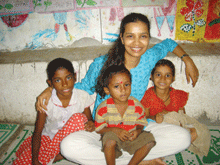In 1969, Meera Mahadevan, a Delhi-based housewife was moved by the plight of a child lying by a busy road unattended, as the parents — construction workers — were obliged to neglect their infant even as they built a new India. That was the genesis of Mobile Creches, recalls Devika Mahadevan (31), the energetic chief executive of Mumbai Mobile Creches (MMC) which provides early childhood care and education to over 5,000 children in its 25 creches staffed by 44 teachers, 41 childcare employees and ten centre managers across Mumbai.
 An economics and sociology graduate of Brandeis University, USA and a Masters in developmental studies from the London School of Economics and development experience in China (as an intern with the United Nations) and later in Zimbabwe with Inter-Country People Aid, Mahadevan has rejuvenated MMC since she was appointed chief executive of this voluntary organisation which was faithfully served by her grandmothers, Rukmini Mahadevan and Sheila Jacob. “After my return to India in August 2002, I worked for three and a half years in Mumbai with SPARC (Society for the Promotion of Area Research Centre), which supports the housing and infrastructure rights of slum and pavement dwellers in 15 countries. This was a very educative experience, and I learned of ways and means to empower local people and communities. But when I received an offer to lead MMC which was in the process of being separated from its Delhi and Pune counterparts, I readily accepted to work with this NGO with which my family has a long term association,” she recalls.
An economics and sociology graduate of Brandeis University, USA and a Masters in developmental studies from the London School of Economics and development experience in China (as an intern with the United Nations) and later in Zimbabwe with Inter-Country People Aid, Mahadevan has rejuvenated MMC since she was appointed chief executive of this voluntary organisation which was faithfully served by her grandmothers, Rukmini Mahadevan and Sheila Jacob. “After my return to India in August 2002, I worked for three and a half years in Mumbai with SPARC (Society for the Promotion of Area Research Centre), which supports the housing and infrastructure rights of slum and pavement dwellers in 15 countries. This was a very educative experience, and I learned of ways and means to empower local people and communities. But when I received an offer to lead MMC which was in the process of being separated from its Delhi and Pune counterparts, I readily accepted to work with this NGO with which my family has a long term association,” she recalls.
Since then, during the past two years, Mahadevan has re-energised MMC and invested it with a new vision. Among the new initiatives: a ‘10 X 10’ goal of doubling the number of children under care in MMC creches from the current 5,000 to 10,000 by the end of the year 2010; empowering and transforming 50 on-site women (with varying education qualifications) into creche, balwadi (pre-school) and non-formal education teachers; and entering into partnerships with the state and local governments to establish crèches at construction sites under the Central government’s ICDS (integrated child development services) programme to safeguard the early childhood health of infants and their mothers. “As the government already has an early childhood care programme, we have accorded high priority to working with it, and MMC has already promoted Mumbai’s first three on-site anganwadis in partnership with ICDS,” says Mahadevan. As a consequence, this NGO’s employee strength has risen from 100 in 2006 to 125 currently, even as funds raised have increased from Rs.80 lakh to over Rs.1 crore.
Looking ahead, Mahadevan is optimistic that the rationale of providing creche facilities and early childhood education to the children of construction workers has impacted managers in real estate, and industry in general. “MMC initiatives are not only being welcomed by the construction industry, we are also receiving enquiries from corporates to establish in-house creches and provide early childhood care and teacher training. Once we reach 10,000 children through on-site MMC creches, we will focus on providing consultancy and teacher training services to other NGOs. That would enable a scaled-up model to ensure that every child on every construction site countrywide will be safe and well-educated,” says Mahadevan.
God speed!
Harshikaa Udasi (Mumbai)